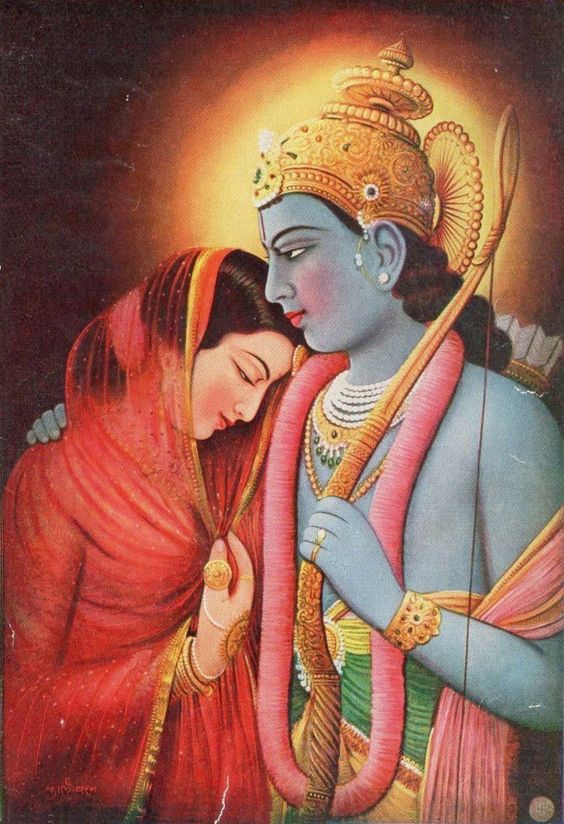One can be either Rama or Ravana, but there is no way to be in between. Our trouble is that we know perfectly well that we are not Rama, but it is a big hurt to the ego and the mind does not want to agree to it. It is hard enough for the mind to say “I am not Rama”, and we cannot say “I am Rama”, because everybody knows we are not and they will just laugh at us. But to liken ourselves with Ravana is equally impossible. So we choose the middle path and declare, “I am not Rama not Ravana, I am in between aat present. Buddhahood and the supreme understanding have not happened to me yet, but neither am I an ignorant and foolish man.”
The idea of being in the middle is very dangerous, because it does not allow you to discover where you really are. It is far better to know that you are a Ravana – and what is wrong in Ravana that you are afraid of? If you understand nature of Ravana, you will see that there is no such thing as being in the middle; at the most your choice is to be a lesser or a greater Ravana. Yes, you may be just a mini-Ravana – a drop rather than the whole ocean – but what difference does this really make to your nature, to your consciousness? The ocean is salty, and a drop of the ocean is salty too.
Buddha says, “If you taste a single drop of the ocean you have tasted the whole ocean. Scientists say that if you analyse a drop of sea water, you have analysed the whole ocean. The ocean is the magnification of that drop; the drop is the microcosm of the ocean. So may be you are a drop, rather than being the whole ocean, but the basic characteristic is the same in either case.
What makes it so difficult to admit to the Ravana in yourself? Just have a look and see what is in Ravana that is not in you. Ravana is mad after wealth, Ravana is obsessed with expanding his empire, Ravana lusts after women. If ravana is attracted, she must dwell in his palace. And Ravana is a great scholar; he knows the scriptures inside out.
Now if we really look into ourselves, which of these characteristics of Ravana is not to be found? No attraction remains in that which is available to us; our attraction is to that which is unavailable, and the more unavailable the more intense is our attraction…
Ravana has no shortage of beautiful women, and it is possible he may well have had women more beautiful then Sita, but her devotion to Rama was so unique that it became a great challenge for Ravana to win her. You too experience the same sense of challenge all the time. This is the characteristics of Ravana’s consciousness – to be interested in what the other has, then in what you have yourself.
Rama has no interest at all in other women; it is as if in Sita is contained for him the whole world. This is the nature of Rama’s consciousness – what you yourself have is all; what you have is the whole. You are in deep contentment, with no demand for what you do not have. In fact, you do not even see more than which that you have.
Ravana’s consciousness, on the other hand, will not be satisfied until he has conquered all and there is no guarantee that he will be satisfied even then. Ravana has no reverence for the individual; the only things that he values are his own sensations – selfishness is his creed.
Look how our sensitivity becomes blunted towards those with whom we live. Because we see them everyday, we find nothing worth seeing in them; knowing them day in, day out, there remains nothing worth searching for in them; acquainted with the whole of their personality, everything comes to feel stale. This is the way of all the senses. Eat a certain food and today it tastes delicious. Eat it again tomorrow and it is a little less appetizing. By the third day we are bored with it, and if we are presented it on the fourth day we will throw the dish out!
This is the way of the sense organs. They get bored with the old and each day is a search for the new. What they want is sensation and sensation is provided by the new. So all societies that are based in the sensual will function according to the formula: search for the new. Societies that are spiritually based will have the characteristic of contentment with the old. Consciousness seeks the eternal, senses seek the novel. Rama has found the eternal in Sita – he has sought that which never grows old, which need never be renewed, and which never knows boredom.
This is the situation in which we are living, this is the state of our own consciousness. What we have is hell, what the other has is heaven! We say, “I shall not be able to rest until I get it,” but the moment we possess it, it becomes worthless. It is this perpetual quest after something else – after the other – that keeps us unhappy. This path offers no possibility of contentment.
An individual with the consciousness of Rama, though he lives in a simple cottage, will be quite unattracted by palaces, because wherever Rama stays becomes for him a palace. But no matter where Ravana stays there will be no palace, only unhappiness, because Ravana only sees the palace that belongs to the other, the palace where he is not, the palace that has to be won.
Ravana’s ten heads are just an indication, a symbol. Ten is a symbolic end because man began to work with numbers by counting on his ten fingers; above ten repetition begins. So those ten faces of Ravana are indicating the upper limit of counting – there is really no end to the number of faces you have, and all day long you are changing it.
Rama has only one face, whether you meet him in happiness or unhappiness, whether he is sitting in a palace or in the middle of the jungle; he does not wear different faces. To have but one face means to have become authentic, to show your true inner face, not to mask your truth on the outside, not to be influenced by circumstances, but to let your face reveal your inner being. Rama’s face remain the same whether you blame ot praise him; no mere circumstance can manipulate his features now. His face has become stable, and the name of this stability is Rama.
If you understand Ravan’s mind, you will find that he is quite firmly established within you; and it is this same Ravana who tries to convince you, “True you are not Rama, but neither you are Ravana!” Pay no attention to his words. You have listened enough to him already, and it is that very listening that has brought you to the state you are in now. So if it is clear to you that you are not Rama, then be clear also that you are Ravana. To accept this in yourself is the first step towards becoming Rama. To accept yourself as full of faults is the first, and the revolutionary step towards virtue. The deep recognition, “I am in darkness”, becomes the search for light. The real thirst for knowing is born in the awareness of your own ignorance.
असतो मा सद गमय,
तमसो मा ज्योतिर् गमय,
मृत्योर मा अमृतम् गमय
Asato Ma Sad Gamaya, Tamaso Ma Jyotir Gamaya, Mrityor Ma Amritam Gamaya
Lead us from ignorance to truth, Lead us from darkness to light, Lead us from death to deathlessness.
Happy Deepavali to you and all your loved ones.
Osho: Nowhere to go but in: Chapter # 6. (Excerpts)
उजाले अपनी यादों के हमारे साथ रहने दो
न जाने किस गली में ज़िंदगी की शाम हो जाए…………….बशीर बद्र
ujāle apnī yādoñ ke hamāre saath rahne do
na jaane kis galī meñ zindagī kī shaam ho jaa.e………..BASHIR BADR
Let the light of your memories be with me
not sure when the dusk of life may arrive.

